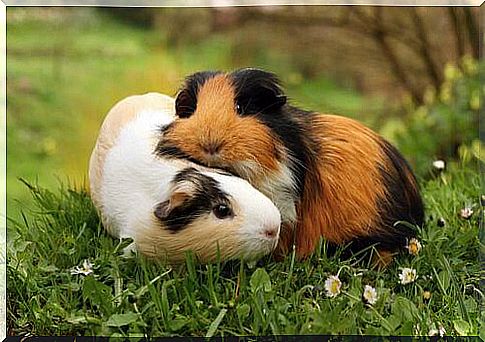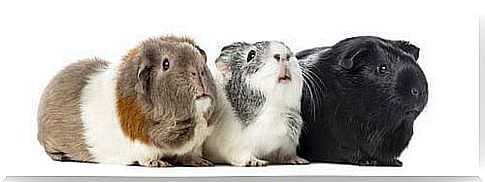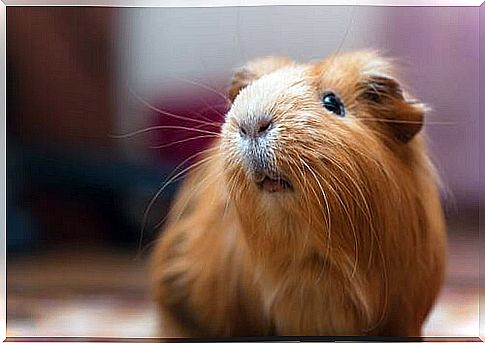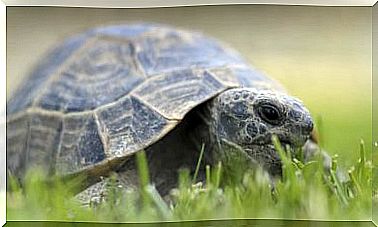The Guinea Pig Cry: Why Do They Squeak?

Guinea pigs in many places on earth are known by the name of cuyes , and this is not by accident. This name, of onomatopoeic origin, refers to the particular sound that guinea pigs emit regularly, both in domestic and wild environments.
Communication in the animal world is a fascinating process, which is why several ethological researchers are trying to decipher the meaning of language in the different species of the animal kingdom. So even in the case of these cute rodents it is common to wonder why they emit their characteristic calls. Below we give you the answer.
About guinea pigs
Before fully entering the world of their communication, it is necessary to know a little better about the species in question. As surprising as it may seem, the guinea pig ( Cavia porcellus ) is a species of hybrid rodent belonging to the Caviidae family.
These curious domestic animals are the result of the crossing of various species of the Cavia genus , such as the Cavia aparea or the Cavia magna . Some of the particular characteristics of these small mammals are the following:
- They come from the Andean region of South America.
- They weigh around one kilogram and live between five and eight years.
- They are herbivorous animals, which require a continuous supply of fiber and vitamin C for an adequate state of health.
- This species has different morphotypes, which differ in the arrangement and nature of the coat.
- They are friendly, calm rodents and live in social groups.
It is this latter feature that gives us the first clue as to why guinea pigs emit their characteristic calls. If an animal lives in society, it must have a way of communicating with its kind, right?

Why do guinea pigs make special calls?
As simple as the question may seem, several ethological studies have formulated experimental models to discover the reason for the guinea pig cry. It is not an easy task, because in addition to the existence of variations on an individual level, these particular references seem to have a different meaning depending on the age of the person who emits them.
The guinea pig is particularly versatile, as according to this research it is capable of emitting up to 11 different shades. Some of them respond to the following situations.
Guinea pigs (especially younger ones) make more audible sounds when in a new environment. This coincides with the increase in cortisol, a stress-related hormone.
When separated from their mothers, guinea pigs emit calls of solitude, which are accompanied by increased movement and general agitation of the animal. Once the babies return to their parents, the mothers emit a series of vocalizations to calm their offspring.
But not everything is related to the relationship between mother and child, since many other vocalizations are related to other processes. Here are some examples.
A sound for every situation
Several studies have investigated when, how and why different sounds are produced in different situations. These are some of the results:
- Chut-chut is the onomatopoeic transcription of the most common vocalization in guinea pigs. It seems to be present in all kinds of situations, be they social or not. The emission of these preliminary sounds is very present when two specimens meet and try to identify each other, only to be replaced by other vocalizations more suited to the situation.
- The sound of the complaint is produced, in general, when a situation causes discomfort in the animal. For example, when a non-receptive female is approached by a reproductive male.
- The squeak occurs when the guinea pig feels some kind of physical pain.
There are many more sounds and vocalizations emitted by guinea pigs, but one idea is clear: these animals emit particular squeaks to communicate with each other. Each tone has a specific function and, from an evolutionary point of view, to warn a fellow of a negative interaction, it is much more effective to do it with a sound than with a physical movement, which requires more energy.

The verse of guinea pigs: a question of sociability
As we have seen, social animals such as guinea pigs have developed complex linguistic mechanisms to communicate different feelings and emotions. This is beneficial for all members of the colony, as they spot dangers more quickly and avoid unnecessary fights between them.
In the animal world, everything has a biological response. Therefore, if you have a guinea pig at home, we invite you to try to understand in what situations and how often it produces its particular calls, as it could try to convey a message, such as continuous stress or a feeling of loneliness.









